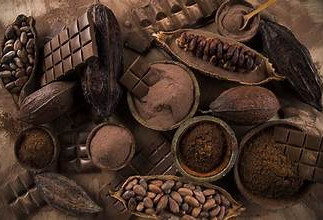The Evolution, Challenges, and Future of Cocoa Products Industry in Ghana
- May 29, 2024
- 4 min read
Updated: May 30, 2024

The cocoa sector significantly contributes to Ghana’s economy. The Cocoa Processing Company (CPC) plays a pivotal role by processing raw cocoa beans into semi-finished products, including chocolate bars and powder. In 2022, CPC’s revenue from cocoa reached $43.5 million. The Ghana Cocoa Board (COCOBOD) registered over 10.2 billion Ghanaian cedis (GHS) from cocoa sales in 2020, equivalent to approximately $758.8 million USD. Cocoa’s contribution to Ghana’s GDP surpasses other agricultural sectors such as livestock, forestry, and fishing. Ghana, renowned as the second-largest global cocoa producer after Côte d’Ivoire, plays a pivotal role in shaping the cocoa market. However, several challenges persistently impact the industry.
In this article, we delve into these challenges and propose strategies for bolstering cocoa production.
Genesis of Cocoa Production in Ghana

Cocoa cultivation in Ghana began in the late 19th century and was fostered by a blacksmith named Tetteh Quarshie. He returned from Fernando Po (now Bioko) island in Equatorial Guinea with cocoa beans and established the first cocoa farm in Akwapim Mampong in the Eastern Region. This marked the beginning of commercial cocoa cultivation in Ghana.
Today, Ghana is the world's second-largest exporter of cocoa beans, after Ivory Coast. In the 2021/2022 crop season, Ghana produced an estimated 683 thousand tonnes of cocoa beans. However, only a fraction of these beans are processed locally. For instance, in the 2018/2019 crop year, Cargill Ghana Limited accounted for over 26% of the locally processed cocoa beans in Ghana. The majority of the beans are exported unprocessed.
Natural Cocoa Powder (1,000kg)
Buy Now
Regulation of the Cocoa Industry by COCOBOD
The Ghana Cocoa Board (COCOBOD) is a key player in the cocoa industry. Established in 1947, it regulates who can purchase and export cocoa, and also has a significant role in pricing. COCOBOD is involved in all steps of cocoa production, from providing inputs to farmers, to regulating who can purchase and export cocoa.
Licensed Buying Companies (LBCs) are authorized to buy and export cocoa. One such company is Federated Commodities Limited (FEDCO), an indigenous LBC established in 1996. LBCs must meet certain criteria to obtain an export license from the Ghana Cocoa Board.
The COCOBOD regulates the sector and determines the price it pays to cocoa farmers per ton. For instance, in April 2024, the COCOBOD announced a revision in the Producer Price of cocoa for the remainder of the 2023/24 crop year. This decision was made following consultations with stakeholders.
Despite its efforts to develop the industry, Ghana still relies on Europe to price its cocoa products. This reliance has made the cocoa industry a bivalent sector, with success for its high quality but failure in terms of pricing autonomy.
Shea Olein - Biofuel and Food Grade (1MT)
Buy Now
Challenges of Cocoa Production
Cocoa production in Ghana faces several challenges that impact cocoa production costs. The high cost of production is a significant issue. These challenges are fuelled by the following elements:
Inflation: Fluctuations in inflation rates directly affect input costs, including labor, fertilizers, and pesticides.
Corruption: Addressing corruption is crucial for ensuring fair pricing and efficient supply chains.
Intermittent Power Outages: Unreliable electricity supply disrupts processing and transportation, adding to production costs.
Additionally, illegal mining activities since 2016 have contributed to the destruction of water bodies and cocoa farmlands, leading to a shortage of cocoa beans. These activities have resulted in large-scale crop losses and the evolution of new diseases and pests, affecting cocoa output and leading to inconsistent yields.
The cocoa output for the 2023/24 season in Ghana is anticipated to be almost 40% below the target of 820,000 metric tons. This significant shortfall is attributed to factors such as strong seasonal winds, lack of rain, smuggling, damage caused by illegal gold mining, and the impact of the swollen shoot disease. This scarcity has had a profound effect on the cocoa industry, leading to supply chain disruptions and price surges.
Cocoa Price Evolution
The evolution of cocoa prices reflects global market dynamics, and efforts to mitigate inflation, corruption, and power outages are essential for maintaining competitiveness in the cocoa sector.
Ghana has witnessed fluctuations in cocoa prices over the years. In 2016, cocoa prices surged to 12-year highs due to an El Niño weather event that caused widespread drought, significantly hampering global cocoa production. Since then, the Ghanaian government has consistently prioritized the welfare of cocoa farmers. Notably, the producer price of cocoa has experienced remarkable growth, increasing by an impressive 336%. Specifically, it rose from GH¢7,600 ($514.00) per tonne during the 2016/17 season to the current unprecedented level. In the 2023/24 season, the producer price of cocoa was further raised by 58.26%, reaching GH¢33,120.00 ($2,238.91) per tonne.

These annual fluctuations in cocoa prices are influenced by global market dynamics and production conditions. The cocoa market, globally, has witnessed significant fluctuations, with spot prices escalating from $2,467 per tonne in January 2023 to an excess of $12,000. This surge in prices is nearly unparalleled in the history of commodity markets.
The cocoa bean scarcity has precipitated a significant shift in the chocolate market. To mitigate the impact of escalating costs, manufacturers have adopted strategies such as reducing the size of chocolate bars, increasing prices, and modifying recipes. Prominent Ghanaian cocoa processing enterprises, including Cargill Inc., Barry Callebaut, and Niche Cocoa Ghana Ltd., have been compelled to suspend operations intermittently over recent months due to this shortage. For example, the state-owned Cocoa Processing Company (CPC) has been functioning at a mere 20% of its capacity.
It’s difficult to predict when the situation will improve. It’s clear that a multi-faceted approach addressing all these issues will be needed to resolve the crisis. However, the exact timeline for this is uncertain and will depend on various factors including policy changes, market conditions, and environmental factors.
Future of Cocoa Producers and Exporters
Despite these challenges, the future of cocoa producers and exporters in Ghana holds potential. Cocoa’s share of agricultural GDP has been increasing rapidly, and existing yield gaps and the prospects of continued high world commodity prices suggest further growth potential. However, the industry needs to address the current challenges to fully realize this potential. Strategies could include improving farming practices, investing in processing facilities, and implementing policies to curb illegal mining activities.
There is indeed a supply crunch. According to reliable sources, Ghana’s Cocoa Board is negotiating to postpone the shipment of 150,000 to 250,000 metric tonnes until next season due to a lack of beans.
Ghana’s cocoa industry stands at a crossroads. By addressing challenges and capitalizing on opportunities, it can not only survive but thrive. A collaborative effort involving government, industry stakeholders, and farmers will pave the way for a resilient and prosperous cocoa sector.
Raw Organic Cocoa Butter (25kg)
Buy Now































































Comments